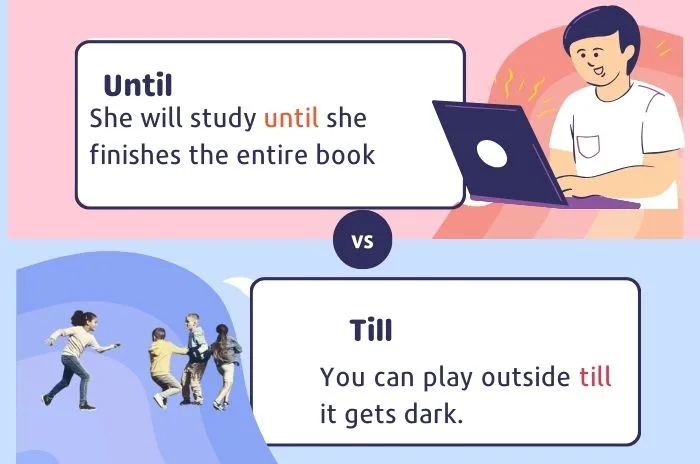There is often confusion between Until vs Till. In this article, we will explain the difference between them. “Until and till are both standard, but what might be surprising is that till is the older word. Until indicates when something will happen, begin, or end. Till means the same thing as until.
We will find out when and how they are commonly used, and provide example sentences that show them in use. Understanding these subtle differences can increase the accuracy of your language.
Define Until vs Till
“Until” is a preposition and conjunction in the English language. It is used to indicate the continuation of an action to a certain point in time.
Example: He will be working until 5 p.m.( Preposition)
I will wait here until you return. ( Conjunction)
“Till” is a proper synonym of the preposition and conjunction. It can also be used as a verb and noun.
Example: “I will wait here till you return.” ( Conjunction)
“The farmer tilled the soil before planting the seeds.”(verb)
“The cashier counted the money in the till at the end of the day.”(Noun)

When Do you use Until and Till?
“Until” and “till” are both prepositions and conjunctions that are used to indicate the duration of an action. They are generally interchangeable and can be used interchangeably in many contexts. Their use can be seen in different ways:
| Until | Till |
| “Until” is used in a formal context, such as academic papers, business communications, or official documents. | “Till” is used in informal spoken English or writing. |
| It is used at the beginning or end of a sentence, as well as in the middle. | It is also used at the beginning or end of a sentence, as well as in the middle. |
| “Until” is used to refer to a specific point in time. | “Till” is used to refer to a point in time. |
Until and Till Examples
“Until” is a preposition and conjunction used to indicate the point in time when something ends or changes. Here are some examples:
- I will be at work until 5 p.m.
- We waited until midnight for the fireworks to start.
- The store is open until 9 o’clock.
- She will study until she finishes the entire book.
- They played games until everyone was tired.
- We can stay here until the storm passes.
- I’ll wait until you arrive before we start the meeting.
- He worked until he was satisfied with the results.
- I won’t leave until you come back.
- They won’t start the movie until everyone is seated.
- They stayed silent until the teacher entered the room.
- They postponed the event until the weather improves.
“Till” is used in many contexts. Here are some examples:
- I will wait for you till 5 o’clock.
- We worked on the project till midnight.
- I’ll wait here till you come back.
- You can play outside till it gets dark.
- I haven’t seen her till now.
- I’ll be at the office till late.
- The cost of the item is $20 till the end of the month.
- The sale is valid till the 15th of next month.
- It was sunny till the storm hit.
- The car was running fine till it suddenly stopped.
- I’ll stay here till you finish your work.
- I’ll love you till the end of time.
- Till the stars go out, my love will remain.
- I’ll be at the park till you arrive.
- She stayed at the hotel till the conference was over.
- You can use my laptop till yours gets fixed.

Read Also: Onto vs On To Difference with 10 Easy Examples
FAQ
Are until and till the same?
Yes, till” and “until” are considered interchangeable in meaning and can be used interchangeably in many contexts. Both words are prepositions and conjunctions that indicate the continuation of an action till a particular time.
What until and till?
Until” and “till” are both prepositions and conjunctions that indicate the point in time up to which an action.
When to use till vs until?
The word ‘until’ is used in the formal form of writing, whereas the word ’till’ has an informal tone.
Can you use till instead of until?
Yes, we can use till instead of until.
Conclusion
Until vs till are both used to indicate a temporal range. Both words convey a specific period of time. “Until” is formal and accepted in both written and spoken English, and “till” is informal but used in casual conversation. Ultimately, the choice between them depends on the context and the desired level of formality.
